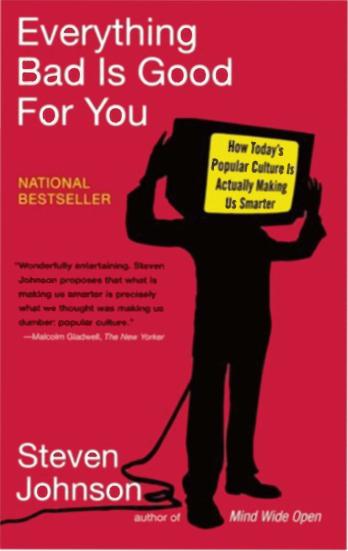Everything Bad Is Good for You: How Today's Popular Culture Is Actually Making Us Smarter by Steven Johnson

Author:Steven Johnson [Johnson, Steven]
Language: eng
Format: epub, mobi, pdf
ISBN: 9781594481949
Publisher: Riverhead Trade
Published: 2006-05-02T00:00:00+00:00
Television…encompasses all forms of discourse. No one goes to a movie to find out about government policy or the latest scientific advance. No one buys a record to find out the baseball scores or the weather or the latest murder…. But everyone goes to television for all these things and more, which is why television resonates so powerfully throughout the culture. Television is our culture’s principal mode of knowing about itself.
No doubt in total hours television remains the dominant medium in American life, but there is also no doubt that the Net has been gaining on it with extraordinary speed. If the early adopters are any indication, that dominance won’t last for long. And for the types of knowledge-based queries that Postman describes—looking up government policy or sports scores—the Net has become the first place that people consult. Google is our culture’s principal way of knowing about itself.
The second way in which the rise of the Net has challenged the mind runs parallel to the evolving rule systems of video games: the accelerating pace of new platforms and software applications forces users to probe and master new environments. Your mind is engaged by the interactive content of networked media—posting a response to an article online, maintaining three separate IM conversations at the same time—but you’re also exercising cognitive muscles interacting with the form of the media as well: learning the tricks of a new e-mail client, configuring the video chat software properly, getting your bearings after installing a new operating system. This type of problem-solving can be challenging in an unpleasant way, of course, but the same can be said for calculus. Just because you don’t like troubleshooting your system when your browser crashes doesn’t mean you aren’t exercising your logic skills in finding a solution. This extra layer of cognitive involvement derives largely from the increased prominence of the interface in digital technology. When new tools arrive, you have to learn what they’re good for, but you also have to learn the rules that govern their use. To be an accomplished telephone user, you needed to grasp the essential utility of being able to have real-time conversations with people physically removed from you, and you had to master the interface of the telephone device itself. That same principle holds true for digital technologies, only the interfaces have expanded dramatically in depth and complexity. There’s only so much cognitive challenge at stake in learning the rules of a rotary dial phone. But you could lose a week exploring all the nooks and crannies of Microsoft Outlook.
Just as we saw in the world of games, learning the intricacies of a new interface can be a genuine pleasure. This is a story that is not often enough told in describing our evolving relationship with software. There is a kind of exploratory wonder in downloading a new application, and meandering through its commands and dialog boxes, learning its tricks by feel. I’ve often found certain applications are more fun to explore the first
Download
Everything Bad Is Good for You: How Today's Popular Culture Is Actually Making Us Smarter by Steven Johnson.mobi
Everything Bad Is Good for You: How Today's Popular Culture Is Actually Making Us Smarter by Steven Johnson.pdf
This site does not store any files on its server. We only index and link to content provided by other sites. Please contact the content providers to delete copyright contents if any and email us, we'll remove relevant links or contents immediately.
| Anthropology | Archaeology |
| Philosophy | Politics & Government |
| Social Sciences | Sociology |
| Women's Studies |
Cecilia; Or, Memoirs of an Heiress — Volume 1 by Fanny Burney(32558)
The Great Music City by Andrea Baker(32018)
Cecilia; Or, Memoirs of an Heiress — Volume 2 by Fanny Burney(31956)
Cecilia; Or, Memoirs of an Heiress — Volume 3 by Fanny Burney(31941)
We're Going to Need More Wine by Gabrielle Union(19045)
All the Missing Girls by Megan Miranda(16023)
Pimp by Iceberg Slim(14506)
For the Love of Europe by Rick Steves(14121)
Bombshells: Glamour Girls of a Lifetime by Sullivan Steve(14073)
Talking to Strangers by Malcolm Gladwell(13370)
Norse Mythology by Gaiman Neil(13363)
Fifty Shades Freed by E L James(13239)
Mindhunter: Inside the FBI's Elite Serial Crime Unit by John E. Douglas & Mark Olshaker(9339)
Crazy Rich Asians by Kevin Kwan(9290)
The Lost Art of Listening by Michael P. Nichols(7506)
Enlightenment Now: The Case for Reason, Science, Humanism, and Progress by Steven Pinker(7311)
The Four Agreements by Don Miguel Ruiz(6763)
Bad Blood by John Carreyrou(6621)
Weapons of Math Destruction by Cathy O'Neil(6279)
